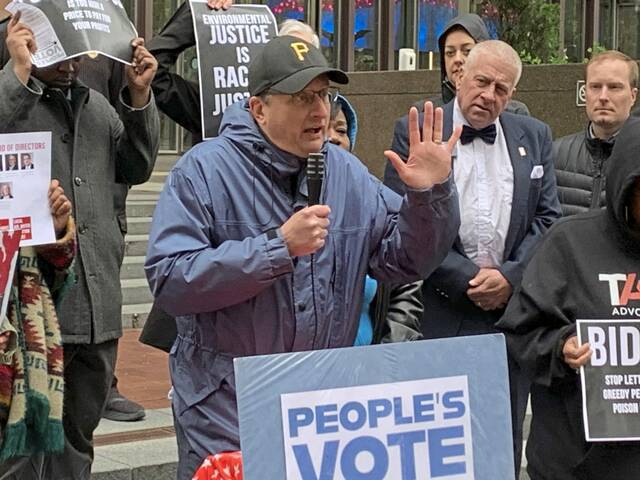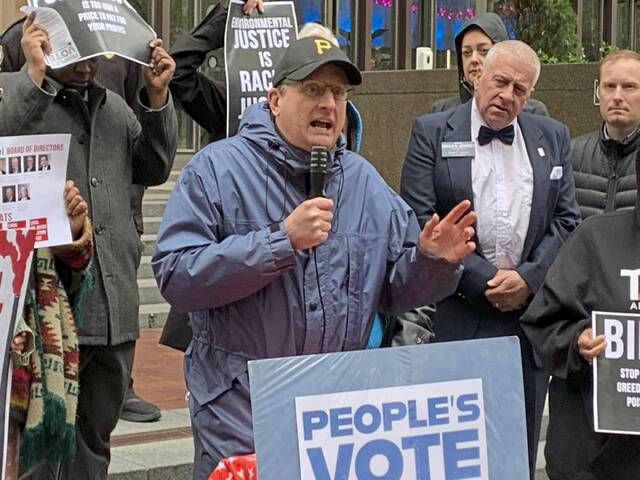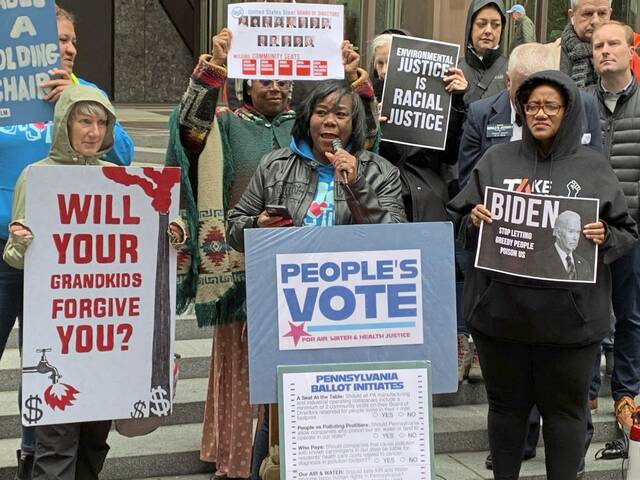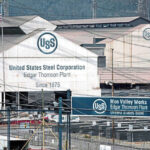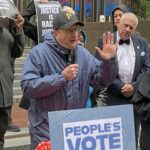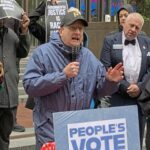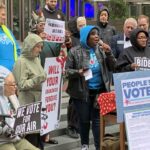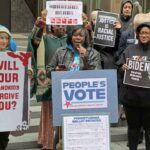Environmental activist and entrepreneur Qiyam Ansari isn’t excited that U.S. Steel is making him money.
He bought $300 worth of the Pittsburgh-based steel giant’s stock at about $15 a share in 2019.
By the time U.S. Steel announced Friday that 98% of voting shareholders approved a $14.9 billion merger deal with Japan’s Nippon Steel, Ansari’s $300 stock investment had nearly tripled in value.
But the expected windfall doesn’t make up for what he said was the company’s marred environmental and public-health record.
“Living here, experiencing the concerns, it’s a little different,” said Ansari, 27, of West Mifflin, president of the group Valley Clean Air Now. “If I was just a shareholder and didn’t live here, would I be happy? Absolutely. It’s all profit. … For them, profit is king, not people.”
Ansari, who has asthma, joined about two dozen protesters Friday on Grant Street near the western corner of the U.S. Steel Tower in Downtown Pittsburgh.
“U.S. Steel, you steal our health!” they chanted, as a woman nearby held a placard reading “Will your grandkids forgive you?”
Shareholders, though, weren’t there to hear the protesters; their special meeting was virtual.
“The overwhelming support from our stockholders is a clear endorsement that they recognize the compelling rationale for our transaction with Nippon Steel Corp.,” U.S. Steel President and CEO David B. Burritt said in a statement. “This is an important milestone as we progress toward completing the transaction.”
Burritt added that the merger “will make U.S. Steel and the domestic steel industry stronger and more competitive.”
U.S. Steel next will seek approval on the deal from regulatory authorities, including the U.S. Department of Justice, company spokeswoman Amanda Malkowski said.
The steelmaker also will disclose the final, certified results of Friday’s vote with the Securities and Exchange Commission when the tally is available, she added.
‘Steel is about security’
The leaders at the United Steelworkers union, which represents 1.2 million workers nationwide, quickly countered U.S. Steel’s claims of “overwhelming” support for the deal.
“We are not surprised by stockholders electing to cash in and sell out the iconic American company’s employees and retirees, along with the communities where we live and work,” union President David McCall and Mike Millsap, the union’s negotiating committee chairman, said in a joint statement.
“Wall Street investors and U.S. Steel executives obviously stand to gain the most from Nippon and its $15 billion while leaving union members in the cold,” they added. “U.S. Steel would have no value if not for the hard work of generations of USW members to build the company into what it is now.”
Pennsylvania’s two Democratic senators also jumped into the fray.
U.S. Sen. Bob Casey, D-Scranton, said his top priority “is ensuring the long-term viability of Pennsylvania’s steel industry and the financial security of the workers who are its backbone.”
“Whether wealthy, out-of-state shareholders of U.S. Steel have endorsed the sale of a key U.S. industrial asset to a foreign owner has no bearing on my views of the proposed sale,” Casey said. “I’ll work like hell against any deal that leaves our steelworkers behind.”
For U.S. Sen. John Fetterman, D-Braddock, “steel is about security.”
“This conversation should be about the steelworkers who power U.S. Steel,” Fetterman said. “I’m encouraged to see Nippon is making commitments to preserving jobs and investing in Pennsylvania. … But it’s still not enough.”
Steel roots in Pittsburgh
U.S. Steel announced the deal with Japan’s largest steelmaker Dec. 18. It stressed the company’s headquarters would remain in Pittsburgh.
The offer from Nippon Steel, the world’s fourth-largest steel producer, was significantly higher than others made for U.S. Steel. In August, Cleveland-Cliffs offered $7.3 billion and Sewickley-based industrial conglomerate Esmark offered $7.8 billion.
U.S. Steel was founded 122 years ago by business titans Andrew Carnegie, J.P. Morgan and Charles Schwab. It has been based in Pittsburgh ever since.
At one time, U.S. Steel was the largest producer of steel — and the largest company — in the world.
Headquartered in Downtown Pittsburgh, U.S. Steel today employs about 3,000 to 4,000 workers in Pennsylvania. Its locally run mills pepper the banks of the Monongahela River and include Clairton Coke Works and Edgar Thomson Steel Works in Braddock, one of the last remaining major steel mills in the Pittsburgh area.
Pollution continues to plague communities where U.S. Steel operates facilities.
In the past two years, Allegheny County and the federal Environmental Protection Agency have fined U.S. Steel a total of nearly $12 million for violating air pollution laws at its Pittsburgh-area plants.
A recent $2.2 million fine is less than a quarter of 1% of U.S. Steel’s 2023 net earnings of $895 million.
Environmental activists like Ansari also point to dire health implications.
A 2020 study showed outdoor air pollution in Clairton, home to the largest coke-producing plant in the U.S., has contributed to more than one in every five children there developing asthma — a rate three times higher than the national average.
A University of Pittsburgh report on air pollution identified coke oven emissions as one of the “top cancer drivers” in the Pittsburgh region. In a four-state area, Allegheny County was the epicenter for cancer risk from hazardous air pollutants, according to that same study.
“A change in ownership needs to come with a change in company culture — one that truly prioritizes public health,” said Group Against Smog and Pollution (GASP) Executive Director Patrick Campbell, after news broke about the shareholder vote.
“At the heart of this deal are actual human beings who have suffered actual environmental harms because of U.S. Steel’s history of noncompliance with air-quality rules,” he added.
Environmental concerns
Former Duquesne Mayor Nickole Nesby said her family’s story is all too familiar in the Mon Valley.
The youngest of eight children, Nesby watched both her parents work hard for years at U.S. Steel.
Her father, a steelworker in the Homestead Works, struggled with his health in later years; her mother, a two-time breast cancer survivor, died from a rare form of small-cell carcinoma in 2002, Nesby said.
Nesby lost a sister to cancer. Her niece died at age 40 from chronic obstructive pulmonary disease, or COPD.
“Most people believe that asthma is hereditary — but it’s environmental,” said Nesby, who’s called Duquesne home for five decades, after stepping away from a makeshift podium set up on the Grant Street sidewalk. “Because this has existed for generations, it’s normal.”
Nesby, like many who spoke during Friday’s protest, said she’s tired of waiting for U.S. Steel to address how its operations impact the environment and, by extension, public health.
“Over the decades, this has been ignored,” Nesby shouted from the podium. “And today, we’re demanding a seat at the table!”
Malkowski said U.S. Steel agrees that protecting the environment is a top priority.
”We respect the voices of all of those in the communities where we operate and where many of our employees live,” she said. “U. S. Steel’s combination with Nippon Steel means that the good-paying, family-sustaining jobs that U.S. Steel provides can endure, while introducing Nippon’s advanced technologies and committed investments.”
Campbell, the GASP executive director, isn’t so sure.
“The potential sale of U.S. Steel … has been in the spotlight for months now,” he said Friday, before the shareholders’ approval was announced. “But every international story has hyper-local impact.”
Staff writer Ryan Deto contributed to this article.



